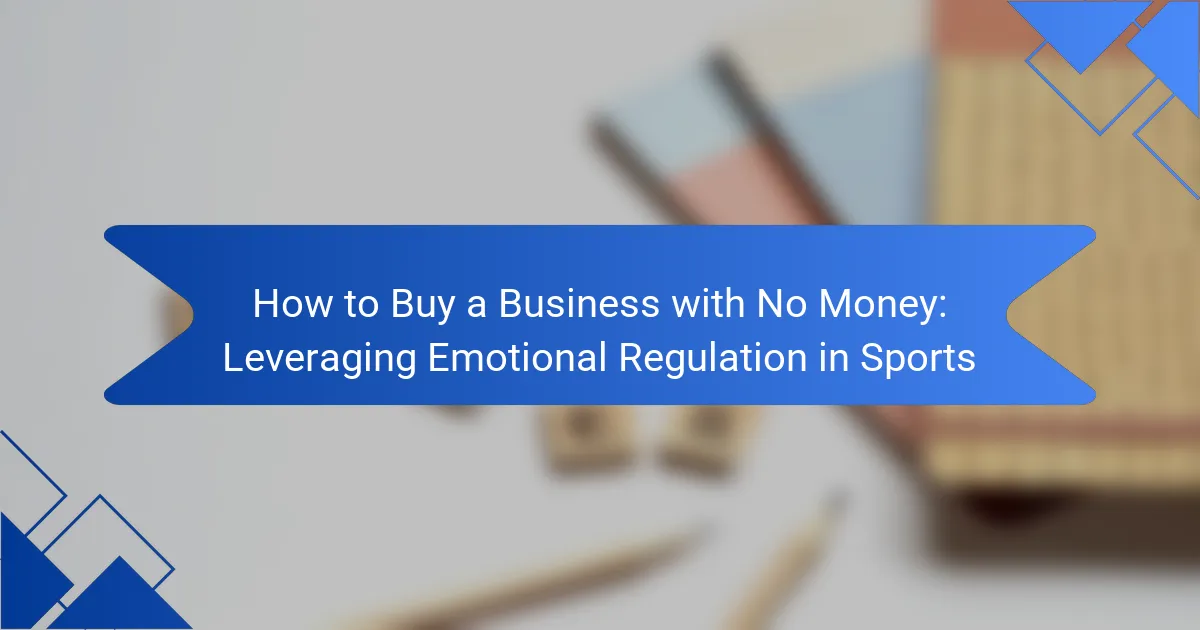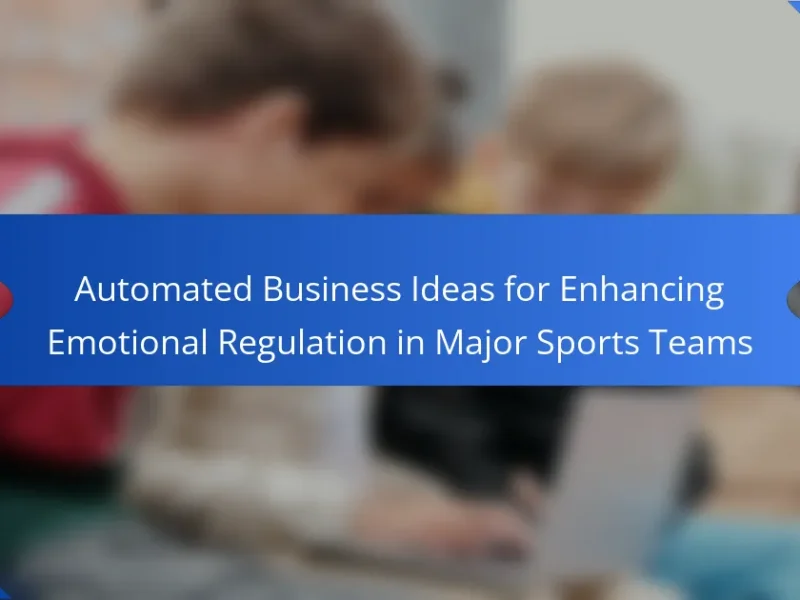Buying a business without upfront capital is a significant challenge. Leveraging emotional regulation techniques can enhance decision-making and resilience during negotiations. This approach fosters trust between buyers and sellers, supports stress management, and aligns long-term goals. By implementing these strategies, entrepreneurs can navigate the complexities of business acquisition more effectively.
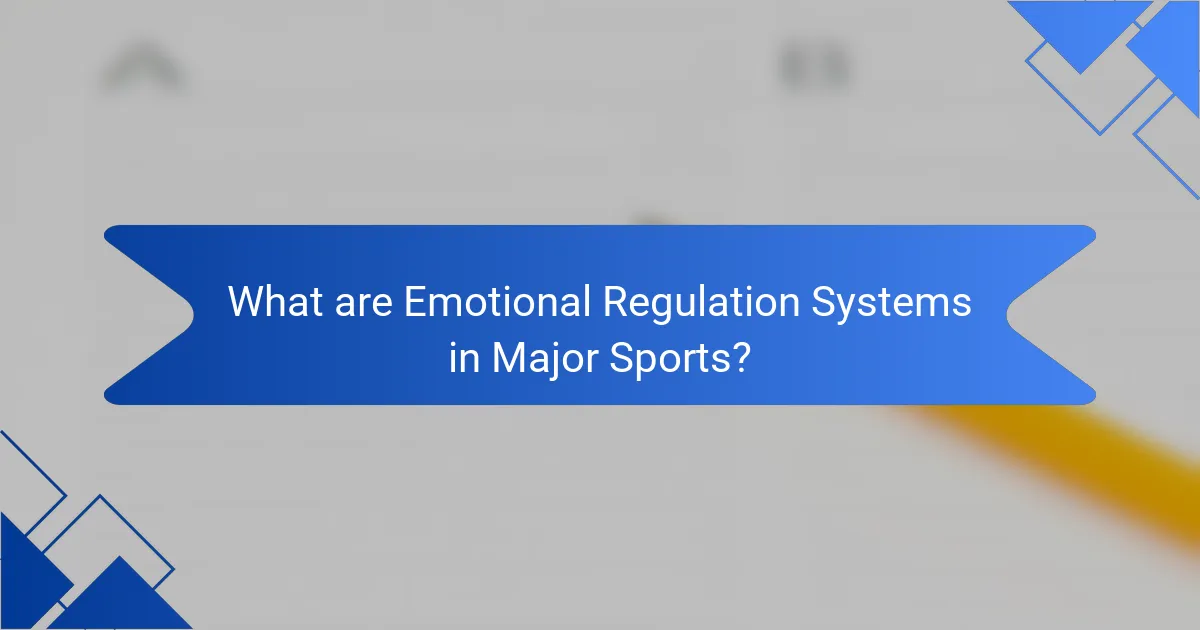
What are Emotional Regulation Systems in Major Sports?
Emotional regulation systems in major sports help athletes manage their emotions to enhance performance. These systems involve techniques that balance emotional responses, such as mindfulness and cognitive restructuring. Effective emotional regulation contributes to focus, resilience, and decision-making under pressure. Research shows that athletes employing these systems often experience improved outcomes, including higher performance levels and reduced anxiety.
How do athletes utilize emotional regulation techniques?
Athletes utilize emotional regulation techniques to enhance performance and maintain focus under pressure. Techniques such as mindfulness, cognitive restructuring, and breathing exercises help manage anxiety and stress. Research indicates that these methods can improve resilience, allowing athletes to recover quickly from setbacks. Emotional regulation fosters a positive mindset, which is essential for peak performance in competitive environments.
What role does emotional intelligence play in sports?
Emotional intelligence enhances performance in sports by improving communication, teamwork, and resilience. Athletes with high emotional intelligence can better manage stress, understand teammates’ emotions, and respond effectively to challenges. This regulation fosters a positive environment, leading to improved outcomes. Additionally, studies show that emotionally intelligent athletes often display greater motivation and commitment, contributing to their overall success in competitive settings.
What are the key components of emotional intelligence in athletes?
Emotional intelligence in athletes comprises self-awareness, self-regulation, motivation, empathy, and social skills. These components enhance performance and teamwork. Self-awareness allows athletes to recognize their emotions and how they affect performance. Self-regulation helps manage impulses and emotions, maintaining focus under pressure. Motivation drives athletes to set and achieve goals, fostering resilience. Empathy enables understanding teammates’ emotions, enhancing communication. Social skills facilitate collaboration and conflict resolution, crucial for team dynamics. Each component contributes uniquely to an athlete’s success in sports.
How can emotional regulation impact performance outcomes?
Emotional regulation significantly enhances performance outcomes by improving focus and resilience. Athletes who manage their emotions effectively can maintain optimal performance under pressure. This regulation fosters a positive mindset, leading to better decision-making and reduced anxiety during competitions. Studies show that athletes with high emotional regulation skills often achieve superior results compared to their peers. By leveraging these skills, individuals can create a sustainable competitive advantage in sports.
What are the universal strategies for emotional regulation in sports?
Emotional regulation strategies in sports include mindfulness, cognitive restructuring, and goal setting. Mindfulness enhances awareness, helping athletes manage stress and anxiety. Cognitive restructuring allows for reframing negative thoughts, promoting a positive mindset. Goal setting provides clear objectives, fostering motivation and focus. These strategies collectively enhance performance and resilience in competitive environments.
What common techniques do athletes use to manage emotions?
Athletes commonly use techniques like mindfulness, visualization, and self-talk to manage emotions effectively. Mindfulness helps them stay present and focused, reducing anxiety. Visualization allows athletes to mentally rehearse performances, enhancing confidence. Self-talk promotes positive thinking, helping to regulate emotions during competition.
What unique emotional regulation practices are found in specific sports?
Unique emotional regulation practices in sports include mindfulness training, visualization techniques, and breathing exercises. Athletes like tennis players use visualization to improve focus and reduce anxiety. Mindfulness helps gymnasts maintain composure under pressure. Breathing exercises are commonly employed in martial arts to enhance calmness and control. These practices not only aid performance but also foster resilience, making them essential tools for emotional regulation in competitive settings.
How do team sports differ from individual sports in emotional regulation?
Team sports enhance emotional regulation through collective support, while individual sports require self-reliance. In team settings, shared experiences foster resilience and coping strategies. Conversely, individual sports develop personal emotional management skills, emphasizing self-discipline. Both contexts offer unique advantages for emotional growth, influencing how athletes handle stress and competition.
What rare emotional regulation methods have been successfully applied in sports?
Rare emotional regulation methods successfully applied in sports include mindfulness training, visualization techniques, and biofeedback. Mindfulness training enhances athletes’ focus and emotional resilience. Visualization techniques improve performance by creating mental images of success. Biofeedback helps athletes gain awareness of physiological responses, allowing for better emotional control.
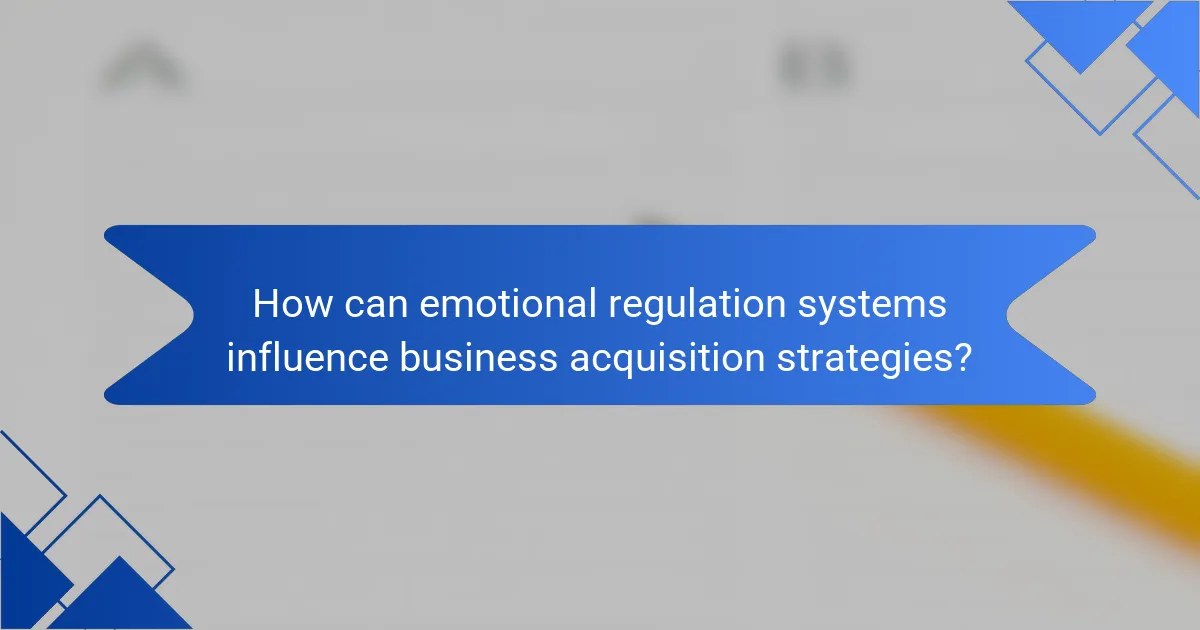
How can emotional regulation systems influence business acquisition strategies?
Emotional regulation systems can enhance business acquisition strategies by fostering resilience and adaptability. These systems help entrepreneurs manage stress and uncertainty during negotiations, leading to better decision-making. By leveraging emotional intelligence, business buyers can build rapport with sellers, enhancing trust and facilitating smoother transactions. Additionally, a strong emotional regulation framework supports long-term vision and goal alignment, crucial for successful acquisitions.
What lessons can entrepreneurs learn from athletes about emotional regulation?
Entrepreneurs can learn resilience and focus from athletes, crucial for emotional regulation. Athletes manage stress through routines and mental techniques, which entrepreneurs can adopt. For instance, visualization helps both groups maintain clarity under pressure. Athletes’ discipline in training mirrors the persistence needed in business. By modeling these strategies, entrepreneurs can enhance their emotional resilience, improving decision-making and performance.
How can emotional resilience contribute to negotiating deals?
Emotional resilience enhances negotiation skills by fostering adaptability and maintaining focus under pressure. This ability allows individuals to navigate challenges, manage stress, and make informed decisions. Resilient negotiators can effectively communicate needs and build rapport, leading to more favorable outcomes. Additionally, emotional regulation helps in recognizing and responding to the emotions of others, facilitating collaboration and trust. These attributes are crucial in high-stakes business negotiations, ultimately contributing to successful deal-making even with limited financial resources.
What emotional challenges do entrepreneurs face when buying a business?
Entrepreneurs face significant emotional challenges when buying a business, including fear of failure, stress from financial uncertainty, and anxiety over decision-making. These emotions can hinder effective negotiation and strategic planning. Emotional regulation techniques, often used in sports, can help entrepreneurs manage these feelings, fostering resilience and clarity. By applying these methods, they can enhance their focus and confidence, ultimately leading to more successful business acquisitions.
How can understanding emotional regulation improve decision-making?
Understanding emotional regulation enhances decision-making by promoting clarity and reducing impulsivity. It enables individuals to process emotions effectively, leading to more rational choices. In business, leveraging emotional regulation can mitigate stress during negotiations, allowing for better assessment of opportunities. This skill fosters resilience, crucial for navigating challenges in acquiring a business without financial resources.
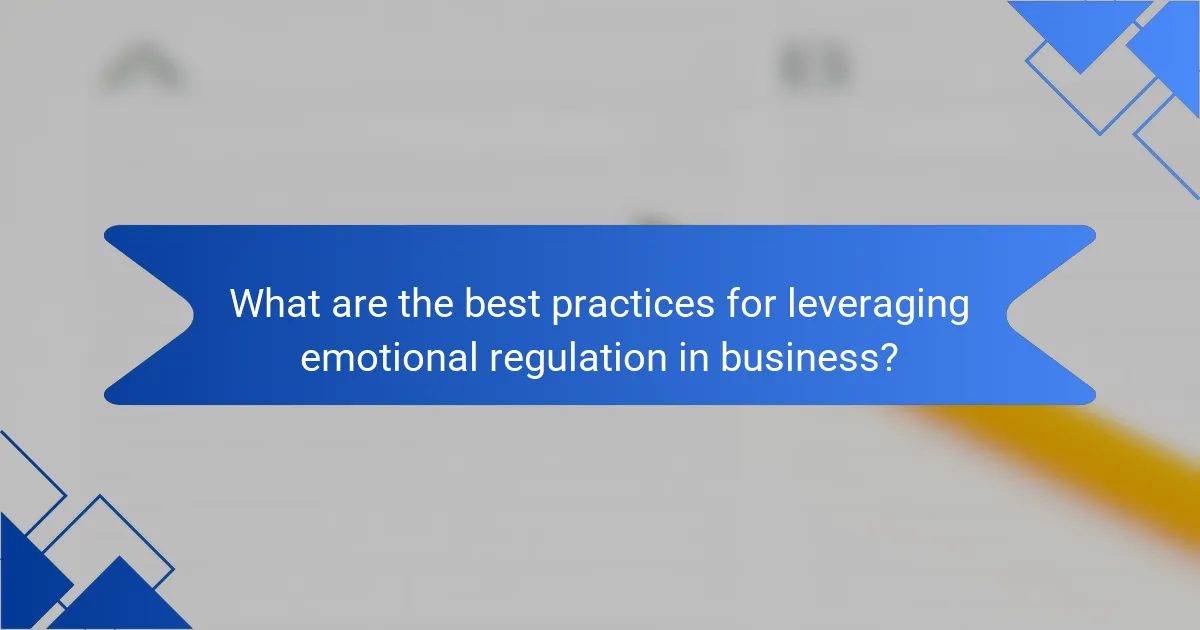
What are the best practices for leveraging emotional regulation in business?
Emotional regulation enhances decision-making and resilience in business. Acknowledge emotions to improve interpersonal relationships and mitigate stress. Techniques include mindfulness, cognitive restructuring, and active listening. These practices foster a positive work environment, leading to increased productivity and employee satisfaction. Implementing emotional regulation can result in better conflict resolution and innovative problem-solving, crucial for business success.
How can entrepreneurs develop their emotional regulation skills?
Entrepreneurs can develop emotional regulation skills by practicing self-awareness, mindfulness, and stress management techniques. These methods enhance decision-making and resilience in high-pressure situations. Engaging in sports can further cultivate these skills through teamwork and competition. Regularly reflecting on emotional responses helps identify triggers and improve coping strategies.
What common mistakes should be avoided in emotional regulation?
To avoid common mistakes in emotional regulation, recognize triggers, practice mindfulness, and maintain consistency. Failing to identify emotional triggers can lead to inappropriate responses. Neglecting mindfulness techniques may hinder self-awareness, while inconsistency in emotional regulation practices can result in ineffective outcomes.
What actionable tips can enhance emotional regulation for business success?
Emotional regulation enhances business success by improving decision-making and resilience. To leverage this, practice mindfulness techniques to manage stress effectively. Set clear goals to maintain focus and motivation. Develop a support network for feedback and encouragement. Use visualization methods to enhance confidence in decision-making. Regularly assess emotional triggers to foster self-awareness and adaptability.
